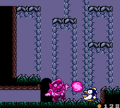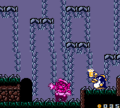Crazy Wario: Difference between revisions
Jumpman M.D. (talk | contribs) (Added some about the form) Tag: Mobile edit |
Jumpman M.D. (talk | contribs) (Added notes about the music) Tag: Mobile edit |
||
| Line 37: | Line 37: | ||
** Crazy Wario is the only advantage-less form in Wario Land II, and one of three such forms in Wario Land 3 (with the other two being Electic Wario and the brief “cut in half” form brought on by beam robots) | ** Crazy Wario is the only advantage-less form in Wario Land II, and one of three such forms in Wario Land 3 (with the other two being Electic Wario and the brief “cut in half” form brought on by beam robots) | ||
* Crazy Wario’s direction is much harder to control in Wario Land 3 than in Wario Land II | * Crazy Wario’s direction is much harder to control in Wario Land 3 than in Wario Land II | ||
* Crazy Wario’s music is a “drunken”-sounding arrangement of the main theme from the first two Wario Land games. Many of the other forms in Wario Land II use their own takes on the main theme, but Crazy Wario’s arrangement is the closest to the original version. | |||
* Though no level in Wario Land 3 uses the main theme of the first two Wario Land games, Crazy Wario is one of three forms in Wario Land 3 to retain noticeable references to that theme. It is joined in this regard by Flat Wario and Bouncy Wario. All three forms use the exact same arrangements as in Wario Land II. | |||
==References== | ==References== | ||
Revision as of 01:13, March 31, 2022
- “Watch out for these penguin-looking guys who throw balls at me. If I get hit, I act really strange.”
- —Wario, Wario Land II
Crazy Wario[1] is one of Wario's transformations in the Wario Land series of games. When hit by a ball thrown by a penguin in the English version of Wario Land II, he becomes a hard-to-control, dizzy alter-ego. While it is difficult to keep him from getting into trouble, Wario can protect himself with his burping power, belching at baddies to defeat them. In Wario Land 3, Wario achieves this transformation when he gets hit by an orange bird, spinning him around and making him dizzy; however, unlike in Wario Land II, Wario does not change color, and he cannot belch to attack. If damaged or doused in water, Wario will be cured. The transformation did not return in Wario Land 4. In the Japanese version of Wario Land II, the ball is a mug of beer, and Wario is considered intoxicated in this condition. The changes during localization were made due to the inclusion of alcohol being seen as inappropriate for a game for the general audience.
Gallery
Sprites
Screenshots
Names in other languages
| Language | Name | Meaning | Notes |
|---|---|---|---|
| Dutch | Crazy Wario[2] | - | |
| Spanish | Wario Loco[4] | Crazy Wario |
Trivia
- Crazy Wario is not able to reach any areas that normal Wario cannot, therefore Crazy Wario’s sole purpose is to hinder the player’s progress though the level.
- Crazy Wario is the only advantage-less form in Wario Land II, and one of three such forms in Wario Land 3 (with the other two being Electic Wario and the brief “cut in half” form brought on by beam robots)
- Crazy Wario’s direction is much harder to control in Wario Land 3 than in Wario Land II
- Crazy Wario’s music is a “drunken”-sounding arrangement of the main theme from the first two Wario Land games. Many of the other forms in Wario Land II use their own takes on the main theme, but Crazy Wario’s arrangement is the closest to the original version.
- Though no level in Wario Land 3 uses the main theme of the first two Wario Land games, Crazy Wario is one of three forms in Wario Land 3 to retain noticeable references to that theme. It is joined in this regard by Flat Wario and Bouncy Wario. All three forms use the exact same arrangements as in Wario Land II.
References
- ^ Wario Land II instruction booklet, page 13.
- ^ Wario Land II Dutch Nintendo 3DS Virtual Console electronic manual, tab 11: "Aandoeningen".
- ^ Official Wario Land 2: Nusumareta Zaihō website
- ^ Wario Land II Spanish Nintendo 3DS Virtual Console digital manual, tab 11: "Estados".
| Wario Land II | |
|---|---|
| Main characters | Wario • Captain Syrup |
| Supporters | Gull • Hen • Owl • Turtle |
| Bosses | Awabō • Big Kamukamu • Bobo • Cave master • Dunk • Ghost • Giant bee • Giant snake • Giant spear man • Mecha Kuri |
| Chapters | Chapter 1 • Chapter 2 • Chapter 2* • Chapter 2** • Chapter 3 • Chapter 3* • Chapter 4 • Final Chapter • Final Chapter* • Final Chapter** • The Really Final Chapter |
| Conditions | Ball • Bouncy Wario • Bubble Wario • Crazy Wario • Fat Wario • Flat Wario • Frozen Wario • Hot Wario • Puffy Wario • Tiny Wario • Zombie Wario |
| Enemies | Bee • Bird • Chūta • Cook • D-Bat • D.D. • Drill • Flame • Gaugau • Ghost • Grunt • Gugi • Inamazu • Kamukamu • Pecan • Penguin • Pirate Goom • Pogo Guy • Punch • Rooster • Tobī • Togemen • Tsuriuo • Utsutsubo • Weight • White puff • Wizard • Yukimaru • Zombie |
| Objects | 10 Gold Coin • 100 Coin • Alarm clock • Anchor • Big Block • Bonfire Block • Brick • Coin • Doughnut block • Enemy Block • Ice block • Kotsuheri • Lance • Spike • Stove • Switch |

